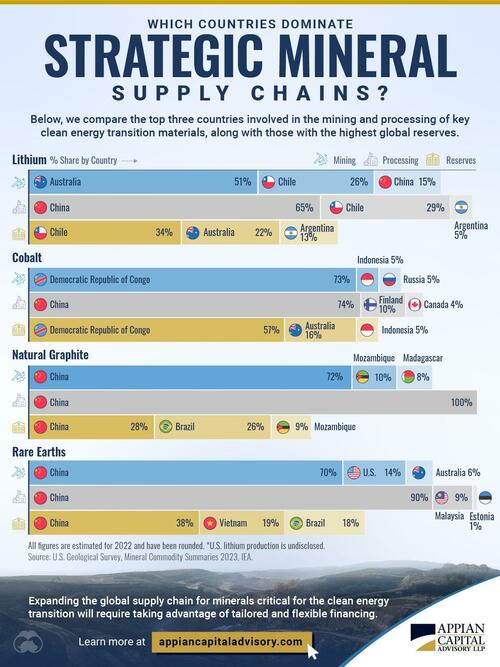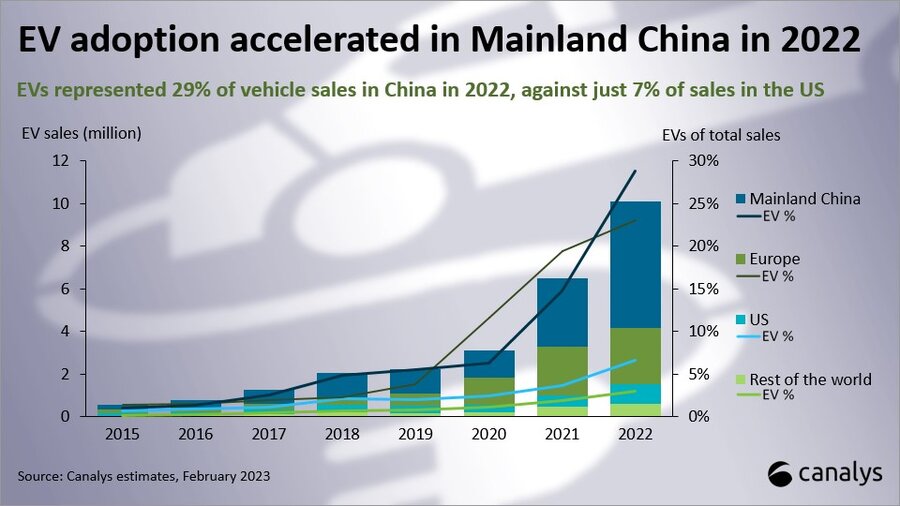
Posted on 09/09/2024 7:32:37 PM PDT by SeekAndFind
As the energy transition continues, tapping into the reserves of critical minerals and securing their supply chains is crucial.
For this graphic, Visual Capitalist partnered with Appian Capital Advisory to provide visual context to the top countries for reserves, production, and processing of minerals that are vital to the energy transition.
The analysis uses data from the USGS and the IEA across four minerals: lithium, cobalt, natural graphite, and rare earths.
South America dominates the reserves for lithium, with nearly half of all known reserves located in Chile (34%) and Argentina (13%). Australia, with 22% of global lithium reserves, is in third place.
The Democratic Republic of Congo is home to the highest share of cobalt reserves, at 57%. Australia, at 16%, also possesses a sizable source of the metal.
Natural graphite reserves are relatively spread out geographically. China (28%) and Brazil (26%) hold comparable amounts. Mozambique (9%) rounds out the top three list.
Rare earth minerals are primarily located in Asia, with China (38%) and Vietnam (19%) holding the greatest reserves. Brazil has 18% of known global reserves.
Overwhelmingly, China is the main hub for processing critical minerals across the board. The country is responsible for processing 65% of global lithium mined, 74% of cobalt, 100% of natural graphite, and 90% of rare earths.
Similarly, mine production is also fairly concentrated. This represents a potential risk to supply chain stability. For each mineral, over half of production occurs in a single country.
For lithium, the top-producing country is Australia (51%) and for cobalt it is the Democratic Republic of Congo (73%). Meanwhile, China produces the highest share of both natural graphite (72%) and rare earths (70%).
Expanding the global supply chain for minerals that are vital to the clean energy transition will require investing in new mining projects, particularly in countries with high reserves but low production and processing rates.
Bkmk
.
bump for later
Yet, we still send $$$ aid to BRICS
Processing minerals is energy-intensive and creates a lot of waste/pollution. Even though with the strictest air and water controls employed - Environmentalists, climate-activists, leftists in Government and NIMBY types have pushed all these processing industries off-shore.
China simply said: “OK, Karen. We’ll take those jobs. Thank you. And it will give us the chance to develop future technology and industry in these areas.”
US has a lot of those, but the enviros pretty much stopped any chance of taking advantage of them.
It all makes materials science the most important industrial investment a nation like the U.S. can make.
I will argue that metals are stored in the ground as ore.
The fact that some nations are the primary suppliers at present does not preclude removing them from in the ground storage if required.
The whole thing is a hoax and soon the EV fad will go away along with the need for all of these exotic metals.
Metals used to make EVs no one wants OR NEEDS.
They’ll take away the ICE cars, and then you won’t have a choice. EV or Walk.


No they won't. Volvo was going to 100% EV by 2030, how did that work out for them?
Did I say “transition”? No. So who are you addressing?
China is dictating EVs. The USA is not a dictatorship, yet.
The only reality in that word is that “transititioning” to more electric (battery “fueled”) vehicles, and different forms of electric production (wind, solar, ect>) may have been in the offing, with or without the climate alarmists. And the reality is those “transitions” could have evolved in a less costly and less economically disruptive manner IF their promotion had not been taken over by the climate alarists and turned into tax credits, government subsidies and government mandates.
Disclaimer: Opinions posted on Free Republic are those of the individual posters and do not necessarily represent the opinion of Free Republic or its management. All materials posted herein are protected by copyright law and the exemption for fair use of copyrighted works.